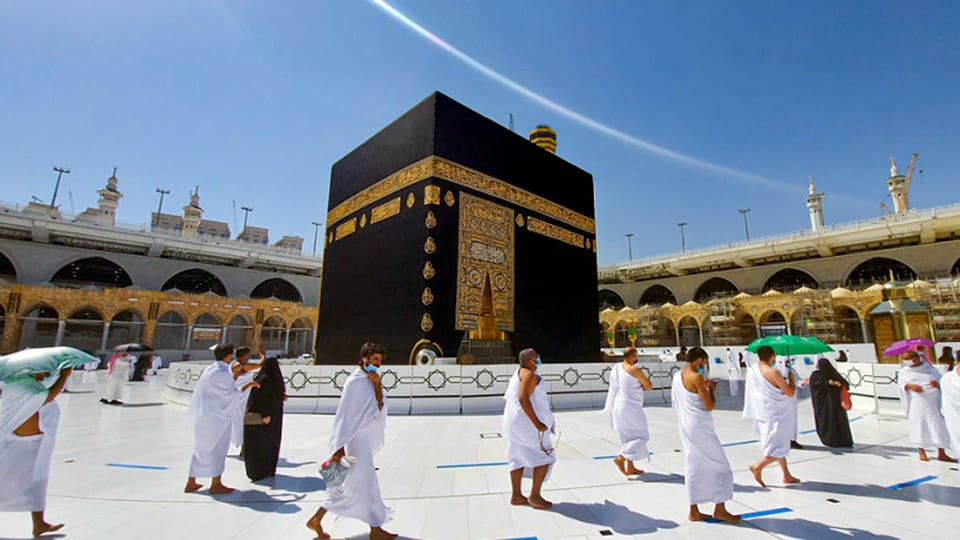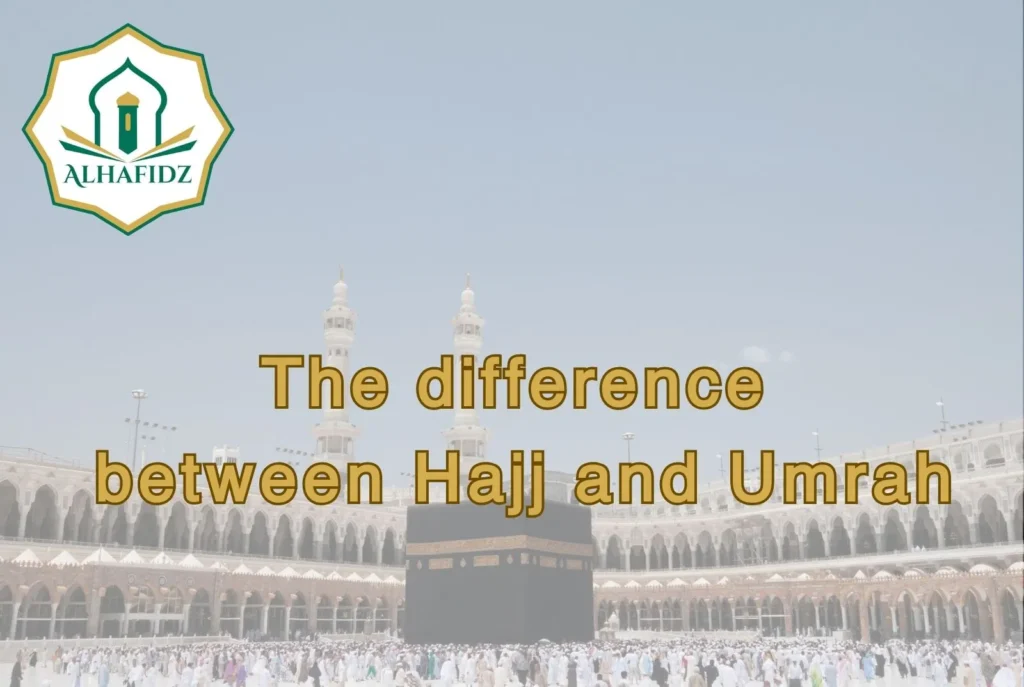A Muslim goes to the Sacred House of Allah in both Hajj and Umrah to obtain the great reward and reward from Allah Almighty. It is said: Hajj is the major Hajj, and Umrah is the minor Hajj, and between the two there are Differences between Hajj and Umrah, the legal ruling, the pillars and duties, and in other matters.
It is worthy of attention to teach children some of the rituals and worship related to the Sacred House of Allah, and to refer to them at the appropriate seasons. So that it instills in their souls the reverence for Allah’s rituals from a young age. Below is an explanation of the Differences between Hajj and Umrah.
Umrah concept
In addition to the Differences between Hajj and Umrah. The concept of Umrah Umrah is defined in the language as a visit in which there is an act of kindness. It was also said that Umrah is a visit, and a pilgrim is a visitor.

That is, one who intends a specific thing. In Sharia, Umrah is defined as visiting the Sacred House, as it is under specific and specific conditions mentioned in jurisprudence. Umrah is the minor Hajj, and the Day of Sacrifice is the major Hajj.
Omrah duty
Speaking about the Differences between Hajj and Umrah. There are four rituals for Umrah, which we mention as follows:
- Ihram is the intention to enter into ritual rituals, whether it is Hajj or Umrah. Among its conditions is that the man must bathe, perfume himself, and wear a loincloth and robe that are clean white in color. The woman may bathe if she is menstruating or postpartum, and wear covering clothing.
- Tawaf is the circumambulation around the Holy Kaaba, where a Muslim circumambulates seven circuits, and this is the opinion of the majority. The Hanafis said that the first four are obligatory, and the rest of the circuits are obligatory, and it is required to enter ihram before performing Umrah.
- Sa’i between Safa and Marwa. Sa’i comes after entering ihram and circumambulating the Kaaba. It begins with Safa, then Marwa, and so on. It is not permissible to do the opposite, and it is seven rounds.
- Shaving or shortening.
Hajj concept
Hajj is defined in the language as the intention to do everything, so the Sharia made it specific for a specific purpose and known conditions, and it was also said that it is the intention to do something great.

Then the concept of Hajj was dominated by its legal and customary use as Hajj and coming to the House of Allah Almighty, and Hajj in Sharia is the intention to go to the House of Allah. Allah Almighty in a specific capacity, a specific and specific time, and specific and specific conditions.
Hajj rituals
When it comes to the Differences between Hajj and Umrah. The concept of rituals or pillars is what the Hajj cannot be completed without, so whoever neglects it intentionally or by mistake, his Hajj is incomplete, and the same applies to Umrah, and these pillars or rituals are:
- Ihram Ihram is considered the basis at the beginning of Hajj or Umrah. It is the first pillar and ritual in them. It is an intention intended by the Hajj or Umrah pilgrim. Whoever abandons it, his Hajj is not completed.
- Standing at Arafat is from the break of dawn on the Day of Arafat until dawn on the Day of Sacrifice, and it is the second pillar or ritual of Hajj.
- Tawaf al-Ifadah: The time for Tawaf al-Ifadah begins at midnight for those who stop at Arafat, and there is no specific limit for the end of it, but doing it on the day of sacrifice is better. It is called Tawaf al-Ifadah because the pilgrim performs it when he breaks his fast from Mina to Mecca, and it is the third ritual of Hajj.
- Sa’y between Safa and Marwah is the ritual or fourth pillar of Hajj
- Shaving or shortening.
The Differences between Hajj and Umrah in concept
In addition to the Differences between Hajj and Umrah. Hajj is defined linguistically as an absolute intention, but in terminology, the most famous definition of it is: “Going to the Sacred House of Allah to perform a specific worship, at a specific time, with a specific intention,” and Umrah means in the language a visit; It is a visit to the Sacred House of Allah to perform rituals.
The Differences between Hajj and Umrah in the ruling
Hajj is obligatory for the Muslim who fulfills the conditions. These are freedom, Islam, maturity, reason, and ability. Whoever meets the conditions must perform Hajj immediately, as it is one of the five pillars of Islam unanimously.
As for Umrah, the opinions of the jurists varied regarding its ruling, and this is explained in the following: Some considered it obligatory once in a lifetime, and this opinion goes back to the Hanbalis and is the most apparent among the Shafi’is.
Others considered it to be a confirmed Sunnah and its performance is desirable, but it is not obligatory, and this is the opinion of Imams Abu Hanifa and Malik.
The Differences between Hajj and Umrah in the time of performance
Hajj is performed at a specific time of the year and it is not permissible to perform it at any other time. Allah Almighty said:
(الْحَجُّ أَشْهُرٌ مَّعْلُومَاتٌ ۚ فَمَن فَرَضَ فِيهِنَّ الْحَجَّ فَلَا رَفَثَ وَلَا فُسُوقَ وَلَا جِدَالَ فِي الْحَجِّ ۗ وَمَا تَفْعَلُوا مِنْ خَيْرٍ يَعْلَمْهُ اللَّهُ ۗ وَتَزَوَّدُوا فَإِنَّ خَيْرَ الزَّادِ التَّقْوَى ۚ وَاتَّقُونِ يَا أُولِي الْأَلْبَابِ).
The most famous information used to perform Hajj is: It is: the month of Shawwal.
The month of Dhul-Qi’dah. The first ten days of Dhu al-Hijjah. As for Umrah, there is no specific time for performing it. Rather, it is available to a Muslim at any time of the year, except for the days of Hajj for those who intend to do so.
Conclusion
At the end of the text, there is a Differences between Hajj and Umrah in both the concept and ruling, as well as the pillars, in addition to the time for performing both of them, so we explained the Differences between Hajj and Umrah in detail through the previous paragraphs.
Empower Your Children’s Islamic Education with Online Arabic Learning
Give your children the gift of understanding the Quran through al hafidz academy‘s comprehensive online learning programs. Our courses are designed for both children and adults, making Arabic language and Quran studies accessible to everyone, regardless of their native language.
What We Offer:
- Interactive Arabic classes for children
- Adult Quran learning programs
- Tajweed (proper pronunciation) instruction
- Islamic Studies curriculum
- Tafsir (Quranic interpretation)
- Various Qirat styles
- Ijazah certification programs
Why Choose al hafidz academy?
- Experienced and friendly Quran teachers
- Engaging eLearning platform
- Structured yet enjoyable lessons
- Personalized attention
- Flexible scheduling options
Our qualified instructors create a welcoming environment where students can develop a deep connection with the Holy Quran. The user-friendly platform makes learning enjoyable and effective, allowing students to progress at their own pace while maintaining high educational standards.
Start your family’s journey in Quranic education today with our experienced teachers who are dedicated to nurturing your children’s spiritual and educational growth.
